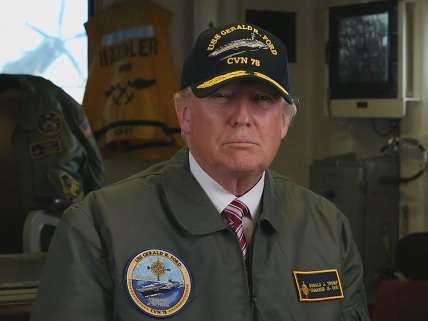Trump Ramps Up American Military Action Abroad
Bombing campaign in Yemen intensifies as additional troops head to Syria, elsewhere.

Despite candidate Donald Trump's welcome sometimes-critical look at long-standing entangling U.S. alliances and arrangements, there was little doubt given his rhetoric on the war on terror that he would ramp up military involvement. He redeclared the war on terror in his inaugural—putting a new face and new rhetoric to a decades-long fight.
Fifty days into the Trump administration, the new contours of the war on terror are starting to take shape. Foreign Policy reports of a renewed bombing campaign against Al Qaeda in the Arabian Peninsula (AQAP) in Yemen following a late January raid the Trump administration insisted was a holdover from the Obama administration. According to Foreign Policy, the Obama administration "handed over plans for a stepped-up campaign to the incoming Trump team in January" and that there'd been "an immediate change in the tempo of operations." The U.S. has now reportedly dropped more bombs on Yemen than in any previous year. Of the 26,000+ bombs the U.S. was estimated to have dropped in 2016, 34 were attributed to Yemen.
According to Foreign Policy, the Trump administration has seen military decisions untethered from much of the policy and bureaucratic deliberations that reportedly slowed down action during the Obama administration. Yemen and the U.S. campaign against AQAP was once lauded by President Obama as an example of a new kind of counterterrorism effort, one with a more limited footprint—the the country collapsed into a civil war after rebels alleged to be backed by Iran ousted the U.S.-backed government out of the capital. Saudi Arabia has since led a military coalition to return the government of Abdrabbuh Hadi back to power. Following the bombing of a hospital, the U.S. suspended some arms sales to Saudi Arabia late last year, but those have been resumed under the Trump administration. Al-Qaeda has benefited from the civil war, gaining territory with the help of a Saudi bombing campaign that, as Foreign Policy explains, is exclusively targeting the Houthi rebels. AQAP can fill the void as, for example, when they took over the port city of Mukalla and began to collect millions of dollars a month in taxes and fees.
The Trump administration is also considering an increase in troop levels in the 15-and-a-half year war in Afghanistan, where the Islamic State in Iraq and Syria (ISIS) has recently established a presence. Gen. Joseph Votel, the head of the U.S. Central Command, which oversees military operations in Egypt, the Middle East, and Southwest Asia, told the Senate Armed Forces Committee a "few thousand" more troops above the 8,500 still deployed in Afghanistan were needed to break a "stalemate" with the Taliban, the Islamist group the 2001 U.S. invasion ousted from power for harboring Al-Qaeda after the September 11 terrorist attacks. At that time, Afghanistan was probably the only country left where Al-Qaeda could set up a base—16 years of U.S. interventions have opened up space in Iraq, Syria, Yemen, Libya, and elsewhere. ISIS, the threat most of the military operations under Central Command target, is a competing militant group to the Taliban in Afghanistan, with any potential alliance possible largel because of a U.S. presence.
Votel also suggested more ground troops were required in Syria—U.S. troops started to arrive in late 2015 to battle ISIS. American troops were also redeployed to Iraq for that purpose. Yesterday, The New York Times reported that the U.S. was deploying an additional 400 troops into Syria, almost as many as are currently there, ahead of the campaign to take Raqqa, ISIS' self-proclaimed capital. The U.S. is deploying 2,500 additional troops to a staging base in Kuwait in support of the campaign against ISIS, Military Times reported, although military leaders would not speak to the paper about the plans for the troops.
"There are a number of options under consideration as the coalition looks for ways to accelerate the defeat of ISIS," a statement from the U.S. military command in Baghdad read, according to Military Times. "We continue to believe that the most effective way to achieve a lasting victory is to do it by, with and through our partner forces who have the greatest stake in the outcome. For operational security reasons, we will not discuss future deployments or contingency operational planning."
The Iraqi government took no formal diplomatic action after it was included in President Trump's first executive order travel ban, instead lobbying members of the administration to be removed from the next version. Iraq's removal from the ban was also recognized as being motivated by its assistance in the campaign against ISIS.
Finally, the Trump administration has also signaled its willingness to expand use of the prison camp at Guantanamo Bay, with Attorney General Jeff Sessions calling it a "very fine place" to hold unlawful enemy combatants, and suggesting the military would decide whether to hold suspects there and whether and how to prosecute them, a shift from Obama administration attempts to prosecute such individuals criminally where possible, and in line with the Trump administration's privileging of military decision-making priorities in the conduct of the war on terror.
The Trump administration inherited battlegrounds in the war on terror all over the world and, thanks to years of Congressional inaction, few limits to how to interpret the post-9/11 authorization of the use of military force (AUMF) which has been used since its passage as legal justification for just not the Afghanistan war but military actions in places like Pakistan, Yemen, Syria, and Iraq after the Iraq war-related withdrawal, against not just Al-Qaeda and "associated forces" but offshoots like ISIS which have become rivals. During the campaign, Trump suggested he would be open to some kind of Congressional vote on an AUMF specifically for ISIS, but despite a bipartisan push no such votes have yet materialized.
